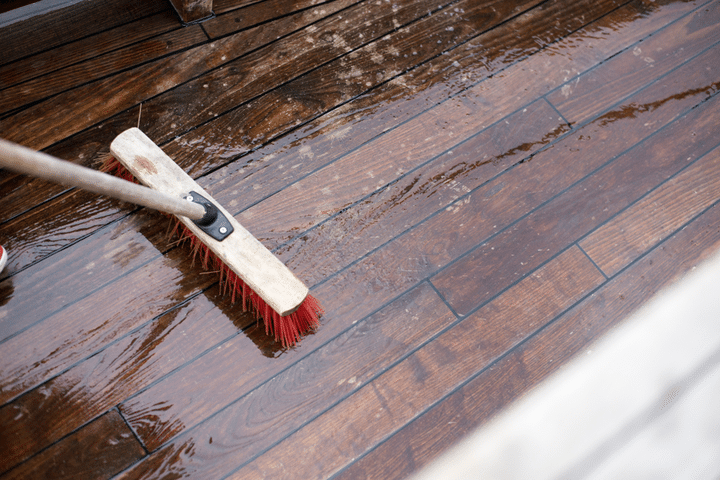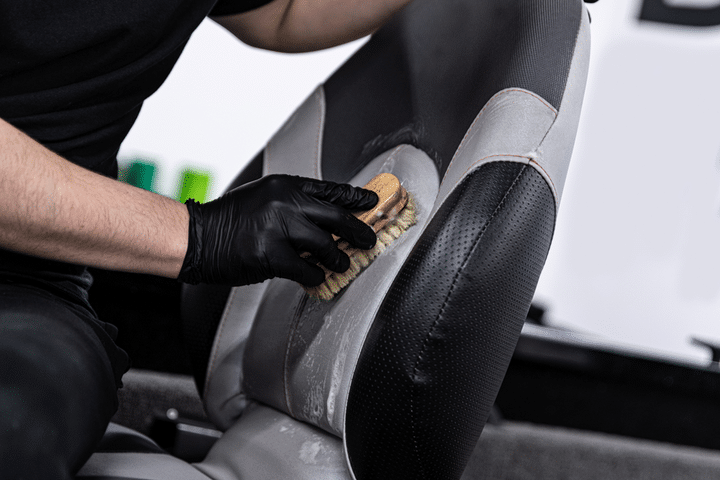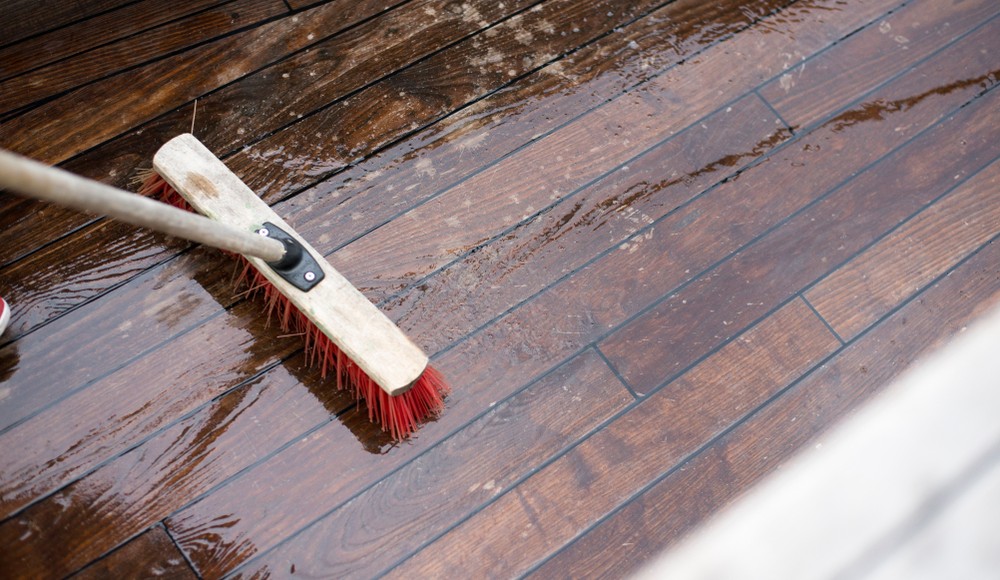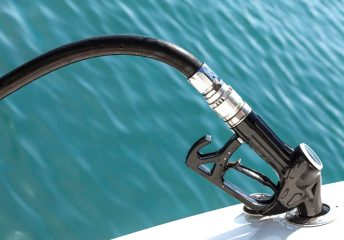7 Ways to Keep Your Boat Clean
Last Updated on January 12, 2024 by Boatsetter Team
Every boat owner quickly realizes that people love going out on the boat, but almost no one likes to stay around to clean it. Cost, maintenance, and cleaning all fall on the shoulders of the humble boat owner who willingly pays that price for the fun and freedom a boat provides. Some boat owners can afford to swallow more costs, and they will pay someone to maintain their boat but, for the rest of us, it’s necessary to learn how to keep the boat clean and running.
Thankfully, there are some tried and true methods for keeping all types of boats clean. The key phrase here is keeping your boat clean. It is much easier to put in the work before using the boat, so you can prevent it from getting too dirty on the water. That’s always better than having to scrub the hull for hours afterward. Preventative maintenance is a boat owner’s best friend.
1. Maintain the Hull

Of all the areas of your boat to get dirty over time, the hull takes the brunt of it. The large surface area of the hull sits in the water and is exposed to UV radiation, algae, salt, and all the muck and grime of the water. When a neglected boat is pulled from the water, the hull beneath the waterline can look like something from a horror movie.
Most boat hulls are made of fiberglass, and they are covered by a gel coat finish to protect them and give them that nice shine. Over time, the sun’s powerful and harmful UV rays can cause this gel coat to age and then crack, exposing the hull underneath. Those exposed areas are then left susceptible to the degrading effects of algae, barnacles, mineral deposits, and whatever else happens to be in the water. Various water pollutants can be especially harmful.
If you just left your boat sitting in the water, exposed to the sun between every use, you would eventually find yourself needing to put in some major work to restore the hull, among other things. There are some relatively easy fixes for this. Ideally, after every use, you should pull your boat out of the water and spray it down with fresh water. If the boat is in daily use and you need to keep it in the water, spray down whatever is above the waterline.
At a minimum, though, while the boat is in use, you need to pull it out of the water to wash and wax the entire hull properly. Taking the time to do this will save you tons of headaches down the road. You’ll need some good brushes, microfiber cloths, and some non-toxic, environmentally safe boat cleaner. This is a good time to check for dents, scratches, or other hull deformities.
Once you have properly cleaned the hull and tackled any stains (start with the least powerful stain removers and work up from there), you can let the hull air dry. Once dry, apply hull wax to secure your work and ensure the life of the hull. Applying this wax will help prevent the hull from getting dirty and will also make it easier to clean in the future.
2. Try Dry Storage

You might be woefully surprised by the number of boats that sit untouched in marina waters and exposed to the sun. Water and sunshine are two of the biggest enemies of boat cleanliness, and over time a new boat will break down under the elements. The only way to preserve the life of a boat when it isn’t in use is to pull it out of the water and store it. Some boat owners shy away from this because of the cost, but it’s an important aspect of owning a boat.
For extended seasonal gaps in use, a large dry storage facility is best because it not only tucks your boat away from the elements but also offers security. For boat owners with docks in their backyards, you should at least have a boat lift and a covered place for your boat. If that’s what you have, you should still check how much rain and sunshine are hitting your boat. Just because your boat is out of the water and covered from above doesn’t mean it is fully protected.
For personal storage situations like this, you should invest in a boat cover. Place the cover over your boat between each use, and you will extend the life of your boat by years. Still, a boat cover isn’t built just to set it and forget it. Sometimes, a poor fit or a small tear leaves room for leaks, leading to mold, mildew, and damage. Always check a boat cover periodically so that your dry storage stays dry.
3. Swab the Deck

You either keep the deck of your boat clean regularly, or you get to spend hours scrubbing off dried and crusted bait and debris. Keeping a boat deck clean is a lot like doing the dishes after dinner. If you rinse and wash the deck immediately after using it, the cleaning process will go quickly and smoothly. However, if you wait, you can expect to break a sweat getting the deck back to its pristine state.
All deck types can be maintained by rinsing them down with fresh water after use. For non-skid decks, you should have a medium-stiff deck brush and environmentally friendly boat soap on hand to scrub away any particularly nasty spots. The rule of thumb is the longer you leave something on the deck, the harder it will be to clean up later. If you do have old stains or difficult to clean areas, make sure you don’t overdo it on the strength of the cleaners you try.
One special consideration is if you have a wooden teak deck. These can be rinsed with freshwater per usual, but you need to treat the deck with a specialist teak deck cleaner twice a year. Never use high-pressure cleaners or hard brushes because these can damage the wood.
4. Remember The Windshield

The plexiglass and glass on your boat need a little attention now and then. It isn’t as susceptible to dirt and damage as other parts of the boat, but there are things you can do to keep it in shape. You should regularly wipe down glass surfaces with a damp cloth to remove any debris, sand, or oils that might have gotten on them. You must also follow that up with a glass cleaner to maintain the clarity of the glass.
Don’t leave the surface wet though, otherwise, you might get water spots. Always dry off glass surfaces after cleaning. Water spots on glass surfaces can especially be a nuisance if you’re out boating in saltwater or dirty bodies of water. To avoid these spots from regular use, apply a good quality water-repellant where needed. The windshield is probably where you’ll need this the most, so make sure you get a repellent suitable for the type of windshield you have.
5. Attend To The Upholstery

The upholstery on some boats looks like an angry tiger was let loose and started tearing through the seats. The vinyl is ripped, the color is faded, and the stuffing is missing and rotted. That’s what happens to your boat’s upholstery if you leave it uncared for and exposed to the elements. The sun and the rain slowly eat away at the integrity of the material until it splits and exposes the stuffing to even more rain and sun. This process incrementally destroys a boat’s upholstery.
To prevent this from happening, there are simple care steps you can follow. First, you should always keep the upholstery clean. Use a damp cloth to wipe away dirt, salt residue, and whatever else might remain from a day on the water. The universal cleaning rule applies here, so the longer something sits on the upholstery, the harder it will be to clean off. You should always have a clean towel or two on hand when on the water just in case something especially bad gets on the seats.
As needed, when the upholstery is thoroughly cleaned, you should also apply a vinyl protectant. This keeps things clean and makes it easier to clean. This simple step can add lots of life to your boat. Finally, as mentioned before, you should use a well-fitted boat cover to prevent weathering from the sun, wind, and rain. Reducing exposure to those elements is what maintains your boat’s upholstery.
6. Flush Your Livewell

This one is for all the people who own a fishing boat. If you regularly go fishing, I’m sure you already know how nasty a Livewell can get. All the bait and fish that come in and out of there regularly leave it grimy and smelly. Then, if you clean it with the wrong supplies, you also have the risk of leaving toxic residue behind. A livewell is great fishing but can be a frustrating point to clean on your boat.
When cleaning your livewell make sure you avoid using any bleach or strong detergents. These leave the most toxic residues, which are very bad for you and very bad for the fish in the well. All you really need to clean your Livewell is a few tablespoons of baking soda in a small tub of hot water. Use that mixture to scrub down all the surfaces of your livewell. Once that is done, rinse the system out a few times, and you are good to go.
7. Check The Engine

What would a clean boat be without a clean outboard engine to make it run? Some boat owners take fantastic care of their boats yet forget to attend to the only thing that gets their boat moving. The mechanical parts on your boat need as much attention, if not more, than the rest. Regardless of the types of waters, you navigate, your engine will accumulate sand and other impurities. Over time, this will lead to corrosion and erosion, ultimately making the engine malfunction and break.
All you have to do to avoid that is to wash the engine down with fresh water. When working around the engine, always keep the boat out of gear and avoid the prop. Following those safety measures, you should spray down the engine to remove as much salt residue as possible. You should also check the water pump for those more mechanically inclined and make sure it is working as intended.
To keep the insides of the engine happy, you might also want to occasionally drain the fuel line and burn off any excess fuel in the carburetor. If fuel is left to sit too long, it can gum up an engine and lead to all sorts of problems. In a similar vein, you should also make sure the engine only runs on fresh fuel. If fuel has sat stagnant for more than a couple of months, it is time to drain it and refuel.
Keeping Your Boat Clean
If you occasionally run preventative maintenance and care on your boat, it will last you for many years. Periodically rinsing off the hull and deck of the boat with fresh water, applying protective wax and coatings where needed, taking advantage of dry storage, clearing the Livewell, and tending to the engine all make for a well-maintained boat. Remember to use non-toxic, environmentally friendly cleaners when possible too. It’s better for you, the boat, and the environment. By following these methods, you will keep your boat clean and ready for the open water.

Boatsetter empowers people to explore with confidence by showing them a world of possibility on the water. Rent a boat, list your boat, or become a Boatsetter captain today.















